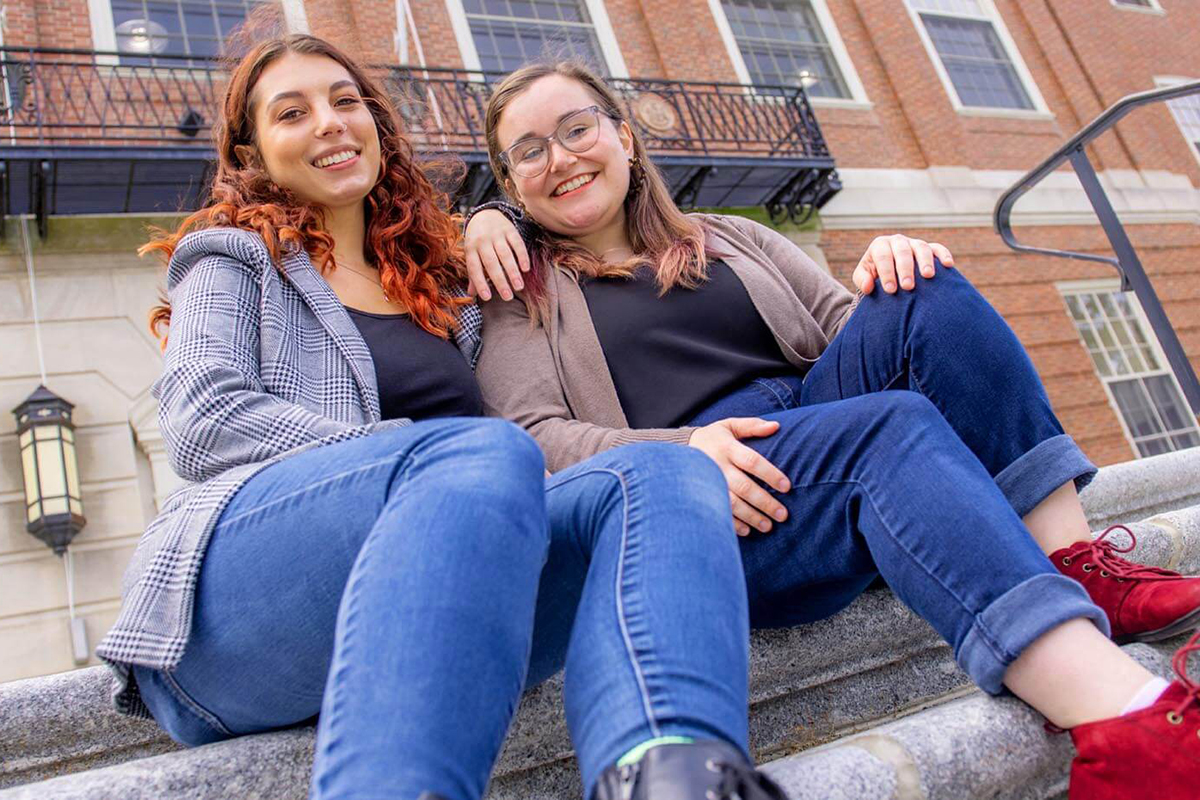
Rachel Breault and Caitlin Galvin: Higher education grad students spend summer gaining valuable work experience
Last spring, Caitlin Galvin was pretty stressed. A graduate student in the University of Maine’s student development in higher education master’s program, she was applying for a summer internship through NODA, the national Association for Orientation, Transition, and Retention in Higher Education.
“It’s very competitive,” says Galvin of Pawling, New York. “Many schools sign up and scout out interns for their orientation programs, so it was a really daunting process. I’m not going to lie.”
With guidance from her adviser, Galvin polished her resume, submitted an application and did several interviews. The hard work paid off when she scored an internship this past summer as an orientation coordinator with Pace University in New York at their Westchester campus in Pleasantville, 45 minutes north of Manhattan.
“I supervised a staff of undergraduate orientation leaders, training them and then planning and executing both virtual and in-person orientation programs. I also did a lot of social media and online promotion of orientation events,” says Galvin, who earned her bachelor’s degree in public relations from SUNY Oswego in 2018 and is on track to get a master’s in higher education from UMaine in 2022.
“At Pace, their orientation program was housed under the Center for Student Engagement. So I really got to connect with the professional staff from that department,” says Galvin. “I also learned a lot just working at a smaller, private institution, which was different from medium-sized public institutions like UMaine or Oswego.”
Rachel Breault, also a master’s student in higher education, did a summer internship at Brown University in Rhode Island. Breault, from Essex, Connecticut graduated from the University of Connecticut in 2020 with a double major in human development and family sciences and women, gender, and sexuality studies.
She applied for her internship through ACUHO-I, the Association of College and University Housing Officers – International. Like NODA, the ACUHO-I internship is competitive. It pairs colleges and universities nationwide with interns interested in careers in campus housing or residential programs.
“I worked with Brown’s pre-college program for high school students. They were there for either two- or three-week sessions, taking a class and getting a taste of college life,” says Breault. “My position was housing manager, and I worked with residential managers, activity directors and other staff on the social side of the program, though we partnered with the educational side.”
When students had issues with their dorm rooms, such as lost keycards or pests, Breault was the one they would call to take care of it. She also was there to support students — many who were away from home for the first time and struggling with loneliness — and she got to help with on-campus and off-campus events, including a talent show.
“It was definitely a collaborative atmosphere. Even though we had our individual roles, we all worked together, which was my favorite part of the experience,” she says.
Breault, who like Galvin is set to earn her master’s next year, says the internship also helped her explore a different side of working in higher education.
“My experience thus far had been mostly working with undergraduate students, whereas the students in the pre-college program at Brown were in the 14 to 17 age range,” Breault says. “Even though it’s still my goal to work with college students, I think it was good for me to work with a younger age group. There were definitely challenges, but it was also very rewarding.”
The student development in higher education master’s program at UMaine is designed to prepare professionals for careers in post-secondary student affairs. The required 225-hour internship is a vital component that gives the graduate students hand-on experience, says Kathleen Gillon, assistant professor of higher education.
“We are a research-to-practice program, where in-class experience is paired with practical experience,” says Gillon. “Typically, students will have completed foundational courses such as Seminar in Higher Education and Developmental Theories in Higher Education prior to starting an internship. These core classes provide a deep understanding of colleges and universities as complex organizations, as well as how college students grow both socially and cognitively throughout their post-secondary educational experience.”
Anywhere from 12 to 20 higher education students participate in internships each year, and Gillon says the program tries to place students in positions that align with their professional goals and interests. Some students choose to intern during the academic year at a local site, including at UMaine, Eastern Maine Community College and Husson University. Others like Galvin and Breault go out of state.
“In addition to the field hours, our students enroll in an asynchronous course where they reflect on their experience and engage in online discussion with classmates. That’s just another way the coursework and the practical experience complement and support each other,” Gillon says.
Breault and Galvin say having their internships align with their interests and goals, as well as being able to apply the knowledge gained in class to a field setting, prepared them well to enter the job market. Both have also worked as graduate assistants during their time at UMaine.
“Going into a career in student affairs, you need to have work experience. Some jobs require at least two years,” says Breault. “Before I even committed to the university, I already had a GA position lined up on campus, which was one of the reasons I decided to come here.”
“The networking opportunities are incredible,” says Galvin. “I have contacts all over the country now through NODA, and my supervisor at Pace set up a bunch of interviews for me, like a one-on-one meeting with the dean for students.”
“It definitely affirmed that I want to work with students and that student affairs is my passion,” she adds.
Contact: Casey Kelly, casey.kelly@maine.edu
